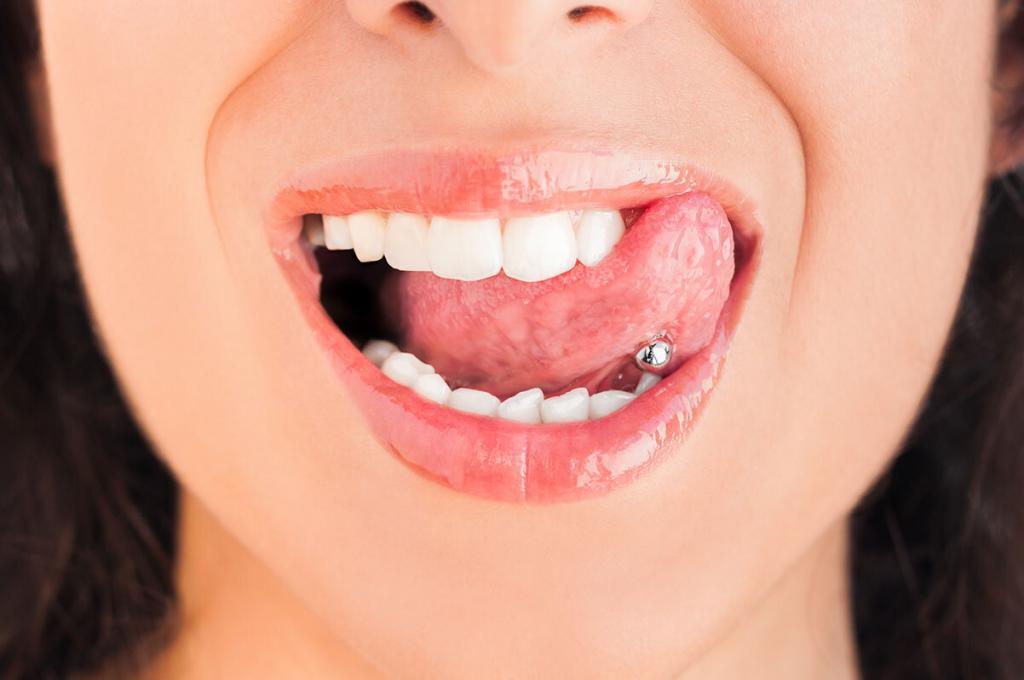Do you have an oral piercing? You can implement the following healthy habits to avoid oral health complications.
A tongue piercing is cool and all, but did you know it can pose adverse effects to your oral health? Below we look at the risks associated with a tongue piercing and how dentists at The Dental Anesthesia Center can help you boost your oral health after a tongue piercing.

Risks Associated with Tongue Piercing
- Pain and Swelling – The procedure of piercing your tongue is painful and can cause swelling. In addition, the tongue is a sensitive organ full of nerves, and the introduction of jewelry interferes with chewing, swallowing, and breathing.
- Chipped and Cracked teeth – After a tongue piercing, you’re likely to develop a habit of bumping your piercing against your teeth when you eat or talk. This can scratch, crack or injure your teeth and gums. It can also make your teeth sensitive and damage fillings.
- Plaque and Tooth Decay – Besides trapping food and debris, having a tongue piercing also accumulates plaque, the leading cause of tooth decay.
- Bacterial Infection – Given its moist nature, your tongue is a host to a variety of bacteria. However, the risk of bacterial infection in your mouth increases when you make an incision and introduce jewelry. Unfortunately, a severe bacterial infection could cause your tongue to swell and may end up blocking the airway.
- Bad Breath – Fresh tongue piercings are hard and painful to clean. This, combined with the constant bacterial presence in the mouth, is likely to give you a stinky breath.
- Permanent Nerve Damage – It’s not uncommon for the tongue to get numb after a tongue piercing. Sadly, this can affect mouth movement and sense of taste.
- Increased Salivary Flow and Speech Difficulties – Oral piercing complications such as excessive drooling and speech difficulties are relatively common. While saliva is essential for oral health, excessive saliva production can change your speech pattern and make you feel uncomfortable and self-conscious.
Other risks associated with tongue piercing include allergic reactions, tearing of the tongue or mouth due to an accidental jewelry rip-out, and transmission of serious infections such as Hepatitis or mouth ulcers.
Ways to Take Care of Your Tongue Piercing and Avoid Problems
You can implement the following healthy habits to avoid oral health complications after a tongue piercing:
- Avoid playing with the jewelry, and keep your piercing site clean.
- Use an alcohol-free mouth rinse during and after the healing period.
- Brush in the morning and before you retire to bed. When brushing, use fluoride toothpaste and a soft-bristle toothbrush.
- Floss daily
- Avoid smoking or vaping as it may complicate your post-piercing healing process.
- Avoid sharing drinks and food to minimize the spread of infectious bacteria.
- Don’t touch your pierced tongue with dirty fingers or hands, as it can expose the area to infection.
- Look for common signs of infection such as pain, swelling, and tenderness.
Contact The Dental Anesthesia Center for Post-Piercing Oral Care
Do you have an oral piercing? Visit the dentists at the Dental Anesthesia Center for the best post-piercing oral care. We are here to help keep your oral health in tip-top shape. Schedule an appointment today.
Call Us Today
The first two board-certified Dentist Anesthesiologists in the state of Missouri.

